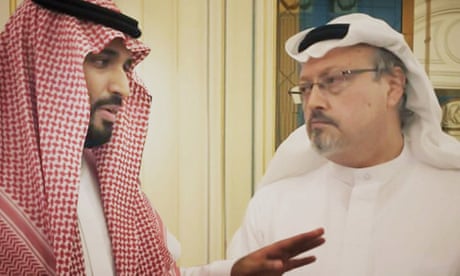The Biden administration has said it expects Saudi Arabia to “change its approach” to the US and signalled that it wants to minimise any direct contact between the president and the country’s de facto ruler, Crown Prince Mohammed bin Salman.
The stance marks an abrupt change compared with the Trump administration, which showered the young heir with attention and praise. It comes as intelligence officials are preparing to release – possibly as early as next week – a declassified report to Congress that will describe its assessment of the crown prince’s alleged culpability in the murder of Jamal Khashoggi, the US-based Washington Post journalist who was killed by Saudi officials in 2018.

The White House press secretary, Jen Psaki, this week said Joe Biden intended to “recalibrate” the US relationship with Saudi Arabia, and considered King Salman – not Prince Mohammed – to be his counterpart. While the designation might technically be true, the 35-year-old prince is widely seen as running Saudi Arabia and has direct relations with other foreign leaders.
In Washington, the question now is whether the latest remark merely represented a symbolic snub, or whether it was more significant, and suggested the US was trying to exert pressure on the king to change the line of succession and demote Prince Mohammed.
In response to a question about whether the administration was seeking to press for such a change, a state department spokesperson said Saudi Arabia was a key partner on “many priorities” but that the partnership needed to “reflect and be respectful of the values and interests the US brings to that partnership”.
“The American people expect that US policy towards its strategic partnership with Saudi Arabia prioritises the rule of law and respect for human rights. Accordingly, the United States will cooperate with Saudi Arabia where our priorities align and will not shy away from defending US interests and values where they do not,” the spokesperson said.
The person added: “President Biden has also said he would want to hear how Saudi Arabia intends to change its approach to work with the new US administration, and we look forward to those discussions to shape the future of our relationship.”
Bruce Riedel, a former CIA analyst and senior fellow at the Brookings Institution, said Biden was sending a clear message to the Saudi royal family that as long as “MBS” – as the crown prince is known – was in the line of succession, Saudi Arabia would be treated “as a pariah”.
“I don’t know what the administration is thinking but the best outcome would be [for Saudi Arabia] to remove him. He can retire to his chateaeu in France,” Riedel said.
Other analysts said it was more likely the administration was seeking to demote and de-emphasise the relationship, even as it has made clear that it has a partnership with the kingdom. Biden used his first foreign policy speech to announce that the US would end support of the Saudi-led offensive campaign in Yemen, and was ending sales of offensive weapons to Saudi Arabia for use in the conflict. At the same time, the secretary of state, Antony Blinken, has said it “remains committed to bolstering Saudi Arabia’s defenses”.

Michele Dunne, the director of the Carnegie Endowment’s Middle East programme, said it appeared that the Biden administration was seeking to send several signals at the same time: that it wants to end US complicity in the Yemen war; wants to pursue an agreement with Iran; and believes there is a legitimate need for Saudi to defend its borders.
“There may also be a new signal now that the new administration is not invested in MBS. Whether that means they are hoping to use US influence to suggest a change in succession, I don’t know. They may be seeking to distance themselves a bit,” Dunne said.
She added that the Biden administration’s concerns probably went far beyond the US intelligence assessment that Mohammed bin Salman personally ordered Khashoggi’s murder.
“The whole world has a problem on its hands when it comes to MBS ascending to the throne because we have all seen how reckless and brutal he is,” Dunne said.
Biden’s approach appears to be roiling Prince Mohammed’s inner circle.
In a comment to Politico, the Saudi businessman Ali Shihabi, who is close to the royal family, pointed out that King Salman was “functioning but very old”.
“He’s very much chairman of the board. He’s not involved in day-to-day issues. Eventually, they’re going to want to be talking directly to MBS,” he said.
Seth Binder, who works in advocacy at Pomed (Project on Middle East Democracy) said he did not believe Prince Mohammed was being particularly singled out by Biden, who had so far decided not to contact many of the region’s leaders. Biden spoke to Israeli prime minister Benjamin Netanyahu on Wednesday.
“Ultimately the distinction they are trying to make is that MBS is one individual and not the whole country, which is contrary to the image MBS himself tries to portray. The idea that [Prince Mohammed] is a reformer who is bringing Saudi Arabia into a new age, it just isn’t true,” Binder said. “While the US might work with autocratic countries, it needs to distinguish between the rulers and the country itself. So its engagement with Saudi Arabia going forward should continue to do this.”


COMMENTS